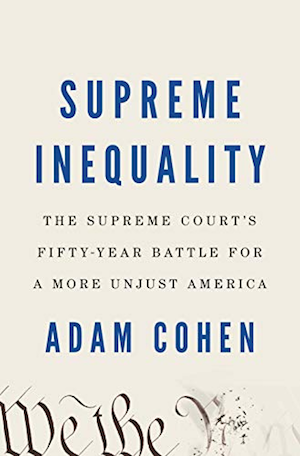By Louis J. Kern
Solon (630-560 BCE), Athenian archon/lawgiver, delineated juridical equity: “wrongdoing can only be avoided if those who are not wronged feel the same indignation at it as those who are.” The US Supreme Court seemingly embodies “Equal Justice Under Law,” but as Cohen demonstrates, for the last half century its decisions have done little to provide jurisprudential relief or support for victims of discrimination and the dispossessed, ruling routinely instead for corporations over people.
Caveat lector—this is not a book for the fainthearted; Cohen does not extenuate the ideological biases or the detrimental effects of the Court’s decisions, nor does he offer a vision of a more equitable and compassionate judicial future. Through analysis of key cases, he demonstrates the Court’s significant contribution to the extreme concentration of wealth, erosion of the middle and working classes, retreat from educational equality, undermining of protections of voting rights, growth of the carceral state, and the dominance of corporate electoral financing overwhelming the democratic process.
Cohen, former public interest lawyer (Southern Poverty Law Center and the ACLU), positions the (Earl) Warren Court (1953-69) as an ideal defender of “suspect classes”—groups discriminated against on racial, religious, or economic bases—whose cases merited “strict scrutiny” as opposed to more customary “rational-basis review.” But the Warren Court was an ephemeral anomaly in the course of modern Court history.
Richard Nixon dismantled the Warren Court—through unconscionable subterfuge forcing the resignation of Abe Fortas (replaced by Harry Blackman) and, through appointment at retirement, Warren, John Marshall Harlan, and Hugo Black were succeeded by Warren Burger, Lewis Powell, and William Rehnquist. The Nixon-Burger Court set the ideological standard for the conservative court with a 5-4 majority that has prevailed the present.
The Court has reinvigorated anti-New Deal, anti-union jurisprudence associated with dicta of NLRB v. Mackay Radio & Telegraph Co. (1938) in Janus v. AFSCME, reversing the right of public service unions to collect mandatory agency fees for collective bargaining in Janus v. AFSCME (2018); sustained states’ rights to maximum grant limits on welfare regardless of circumstances in Williams v. Dandridge (1970); undermined the Voting Rights Act in Shelby v. Holder (2013) that struck down the anti-discrimination preclearance process; permitted school segregation in Detroit in Bradley v. Milliken (1974); reinforced police and prosecutorial powers, disallowlng in McCleskey v. Kemp (1987) challenges to criminal justice based on racial discrimination; opened the floodgates to electoral “dark money” in Citizens United v. Federal Election Commission (2010) by declaring that corporate (artificial) persons had free speech rights; and directly politicized itself in Bush v. Gore (2000), legitimizing the election of George W. Bush by halting ballot counting in Florida.
While the Court consistently denied “suspect status” based on race, poverty, or class, it privileged sexuality and gender—Roe v. Wade (1973), Lawrence v. Texas (2003), striking down sodomy laws, US v. Windsor (2013), invalidating Sect. 3 of DOMA (1996), and Obergefell v. Hodges (2015) that legalized same-sex marriage. All cited cases except Roe (7-2) were decided 5-4.
In a starkly polarized America, Mitchell McConnell, through perfidious malversation, prevented Barack Obama from appointing Merrick Garland to the Supreme Court, arguing that with eleven months remaining of the president’s term the appointment should be delayed until after the election.
Currently the hypocritical McConnell is forcing a pell-mell, frog-march confirmation (to secure a conservative super-majority, 6-3) of Donald Trump’s nominee, Amy Coney Barrett, with barely 27 days to the election. A clearer confirmation of Cohen’s arguments re the insupportable politicization of the Court cannot be found. The “Guardian of Liberty” is no longer the people’s last resort: cuius curia eius Justitia (whose the court, his/hers the justice).
Louis J. Kern (ΦBK, Clark University) is professor emeritus of history at Hofstra University. Hofstra University is home to the Omega of New York chapter of Phi Beta Kappa.




